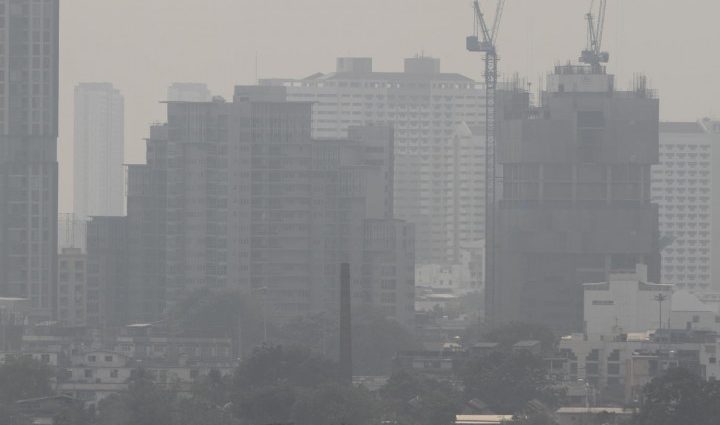Governor Chadchart is aiming to turn clear-the-air election talk into action.

The Bangkok Metropolitan Administration (BMA) is preparing to deal with the capital’s upcoming smog season and has drawn up plans to work with related official agencies to mitigate air pollution at its source.
Bangkok governor Chadchart Sittipunt said the BMA has coordinated with the Ministry of Natural Resources and Environment (MNRE) to create 16 new action plans aimed at solving the city’s air pollution problems over the long term.
One of Mr Chadchart’s main election campaign pledges was to tackle Bangkok’s poor environmental conditions which he said were a major public concern.
“The people want to see improvements, and so the BMA has set up a working group with the MNRE to tackle the city’s environmental issues, including the city’s severe smog problem,” Mr Chadchart said.
“[The] BMA and MNRE have been closely cooperating in the preparation for designing collaborative action plans between all related official agencies in order to address every aspect of the air pollution problem in the capital.”
Long-lasting problem
Air pollution is not new to Bangkok, and as a bustling metropolis with sizeable industrial zones, it’s near impossible for its residents to avoid exposure to it.
According to the World Health Organization (WHO), prolonged exposure to harmful pollutants in the air can greatly increase the risk of diseases including stroke, heart disease, and asthma.
The WHO says that the annual average level of fine particulate matter smaller than 2.5 microns or PM2.5 should not exceed 5 microgrammes per cubic metre of air (μg/m3). Bangkok had an annual mean PM2.5 level of 20 μg/m3 as of 2021.
Such poor air quality has taken a steep toll on the well-being of Bangkok residents.
A Greenpeace report, “The Burden of Air Pollution in Thailand 2021”, said air pollution in Bangkok last year was responsible for up to 4,400 premature deaths while increasing the risk of premature death by 13%.
Although air quality in the city generally stays within acceptable levels for most of the year — due to coastal winds bringing in clean air and pushing air pollution out — the pollution situation often intensifies during winter months.
During this period, a temperature inversion phenomenon, triggered by colder weather, shuts down the airflow over the city and traps the pollution within the city, causing an accumulation of harmful pollutants such as fine particulate matter with a diameter of PM2.5 that forms a thick toxic smog.
While the former BMA administration unsuccessfully tried to mitigate the hazardous spike of PM2.5 pollution during smog season, the new governor is confident that the BMA’s new action plans will be able to handle upcoming critical smog situations.
These 16 action plans include stricter regulations to control pollution emissions from the transportation sector, industry, and construction sites.
There are likewise plans for air pollution monitoring and warning system improvements, plus clean energy campaigns including those focused on the use of electric vehicles. Projects identifying air pollution sources are also part of the initiative.
“Right now, we have already operated all of these action plans with the MNRE as our main partner. So, I am sure that there will be more official agencies, such as the traffic police or Department of Land Transport, joining our air pollution control efforts when the smog season comes,” Mr Chadchart said.
Close collaboration
The 16 new action plans also align with the National Action Plan that aims at reducing the city’s pollution.
Athapol Charoenshunsa, director-general of the Pollution Control Department (PCD), said the department and the BMA are working closely to clean the city’s air.
“The air pollution situation in Thailand over the last three years has been improving, which indicates the implementation of mitigation measures and policies under the National Action Plan to tackle air pollution have been effective, so I am confident that this year’s PM2.5 smog situation will not be beyond our control,” Mr Athapol said.
He said all related agencies are currently preparing updated action plans to cope with the upcoming smog season.
The plans are based on the evaluation of previous air pollution mitigation efforts and smog forecasts for 2023, Mr Athapol said.
As the PCD is the primary agency responsible for overseeing the official coordinated responses to tackling the smog issue, he said the department is working closely with the BMA under the joint committee on the tackling of air pollution problems in Bangkok.
“We are now coordinating with the BMA on air pollution reduction at its sources by focusing on controlling the pollution emissions from the construction and transport sectors,” Mr Athapol said.
“The city’s traffic congestion and the many construction projects throughout Bangkok are among the primary sources of air pollution within the capital,” he said.
“So far, the new Bangkok governor is very proactive in efforts to push forward his policies to ensure equal access to clean air and a healthy environment for everyone. We’re looking forward to continuing productive collaborations with the BMA in solving the city’s chronic air pollution problems.”

